|
|
|
Sort Order |
|
|
|
Items / Page
|
|
|
|
|
|
|
| Srl | Item |
| 1 |
ID:
160381
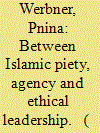

|
|
|
|
|
| Summary/Abstract |
In the face of the huge expansion in the number of women preachers throughout the Muslim world and beyond it, the paper proposes the need to theorise female ethical leadership – the subtle detour that Muslim women have been making to claim rights, including the right to leadership, within Islam, through their extraordinary acts of ascetic self-discipline (askesis). Building on Saba Mahmood’s Politics of Piety, the paper draws further on Foucault’s theory of the ethical subject, particularly in Volume III of The History of Sexuality, to demonstrate that it is women’s everyday asceticism coupled with their scholarly hermeneutical knowledge that is enabling these women to breach the citadel of male Islamic scholarship and leadership. In effect, they are foregoing certain personal freedoms in order to gain power and influence in religious spheres previously closed to them. In this their movement resembles feminist movements in Judaism and Christianity.
|
|
|
|
|
|
|
|
|
|
|
|
|
|
|
|
| 2 |
ID:
160379
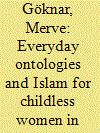

|
|
|
|
|
| Summary/Abstract |
This article discusses the significance of everyday Islam as a gendered locus for socialisation. Religious practices and conversations about religion comprise a major part of quotidian activities in the two villages in northwestern Turkey where the research took place. Men and women's everyday interaction with Islam dominated their ways of thinking, acting and especially socialising. Exploring the ways in which the Qur’an and the Hadith as discursive resources of Islam influence power relations and everyday practices, the article argues that Islamic morality co-exists with everyday Islam.
|
|
|
|
|
|
|
|
|
|
|
|
|
|
|
|
| 3 |
ID:
160374
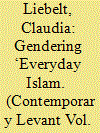

|
|
|
|
|
| Summary/Abstract |
In this introductory paper, we contribute to the important debate on 'Everyday Islam' by thinking about ways in which the everyday constitutes a useful analytical category in relation to Islam, not in contrast to studies of Islamic piety and normativity, but as co-constituted with (Islamic) morality. Secondly, drawing on a feminist critique in anthropology that is intricately linked to the discussion of the everyday in the wider Mediterranean, we seek to insert 'gender' as an analytical category into the debate on everyday Islam and quotidian life in the region, focusing on norms of femininity and the particular experiences of women. The focus on women, we argue, is especially suited to analyse the gendered dynamics in Muslim-majority societies and indeed an almost revolutionary process within Islam in recent years, namely that of women becoming knowledgeable, self-reflective and 'literate' in reference to the hermeneutics and rhetorics of Islamic texts.
|
|
|
|
|
|
|
|
|
|
|
|
|
|
|
|
| 4 |
ID:
160376
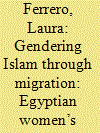

|
|
|
|
|
| Summary/Abstract |
Italy is the first European arrival country for many Egyptian migrants. A first wave of Egyptian male migrants in Italy was followed by a family reunification phase, with the result that the number of Egyptian women increased in the last decades. Studies of their diasporic experience, nonetheless, are still rare. In particular, analysis of women’s relationship with Islam is needed. Building on the anthropological work which has recently showed how the everyday constitutes a useful analytical category in relation to Islam, the aim of this article is to describe and analyse women’s activities in a mosque in Turin during the years 2011–13. I argue that the role of religious spaces in the context of emigration goes beyond the religious sphere, and women’s participation should therefore be understood from a dual perspective: religious and spiritual, on the one hand, and social and cultural, on the other. The description of women’s everyday practices in religious space allows for a reflection on how migration shapes new Islamic identities that are co-constituted with morality, secularism and displacement. The article contributes to the debate on ‘everyday Islam’ by showing that the effects of migration on the religious experience, far from being homogeneous, can encompass both normativity and resistance.
|
|
|
|
|
|
|
|
|
|
|
|
|
|
|
|
| 5 |
ID:
160377


|
|
|
|
|
| Summary/Abstract |
This article draws from the author’s study of marital breakdown in South Asian Muslim families in Britain, in which she found women engaging with an Islamic advice literature about marriage, much of which develops themes which were established in the reformist literature from colonial India, but redirects these themes to stem a recent tide of divorce. In the long haul of difficult marriages, she found women to be educating themselves about and working themselves into the mould of this literature, but also using these teachings in ways that diverge from the stated intentions of the authors, taking this literature as a benchmark of what a wife should expect from a husband and considering their infraction just cause for ending their marriages, or finding legitimacy for remarriage, rather than reversing the contemporary swell in divorce. Engaging debates over the work of Saba Mahmood and her critics, the everyday here appears to be resistive, in contrast with the patient submission of the religious virtuoso. It becomes clear, however, that women inscribe their moves towards divorce and remarriage within, rather than in opposition to, Islamic norms and values.
|
|
|
|
|
|
|
|
|
|
|
|
|
|
|
|
| 6 |
ID:
160375
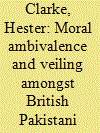

|
|
|
|
|
| Summary/Abstract |
This article explores perceptions and performances of veiling as they are mediated by notions of piety, overlapping and alternative moral narratives, and understandings of belonging. For the young British Pakistani women I met in Sheffield, expressions of piety such as veiling, are negotiated through an underlying understanding of possessing ‘good intention’ and related moral discourses of being a ‘good person’ and a ‘good girl’. Discussions of what it means to be ‘good’, whether explored through narratives of piety, universal personhood or gendered ethnic identity, are mediated by relations with kin, the wider Pakistani community and understanding of British multiculturalism. In this article, the author argues that veiling practices should be explored not only through the multiple moral discourses which influence women's choices, but the wider raced and classed structures in which such choices are embedded.
|
|
|
|
|
|
|
|
|
|
|
|
|
|
|
|
| 7 |
ID:
160380
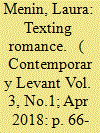

|
|
|
|
|
| Summary/Abstract |
Over the last decade, the mobile phone has become an integral part of a subterranean ‘youth culture’ of romance in urban Central Morocco. By expanding the opportunities of male–female interaction, the mobile phone enables young women to explore the possibilities of emotional and physical intimacy beyond conventional rules of courtship. The desire for premarital romance, though, collides and interweaves with conventional gendered practices and moralities, as well as with the new religious sensibilities that have emerged with the Islamic revival. Tracing the ways Zahra and Yasmin, two unmarried women in their early 20s, mediate dynamics of flirting, seduction and jealousy via the mobile phone, the author shows how they affirm their respectability through and not in spite of their intimate mediated practices. Far from being only a powerful ‘mediator’ between intimate desires, social expectations and public morality, the mobile phone reveals itself as integral to the ways Zahra and Yasmin reflect on, and act in, their intimate and moral worlds. The author hopes to contribute to ‘gendering’ anthropological debates on ‘everyday Islam’ by showing the nuanced ways in which young women in Central Morocco use the mobile phone to shape their intimate lives, navigating competing femininities and gendered moralities.
|
|
|
|
|
|
|
|
|
|
|
|
|
|
|
|
| 8 |
ID:
160378


|
|
|
|
|
| Summary/Abstract |
This article analyses how second-generation Moroccan women are integrating new ways of understanding Islam and morality into their everyday. The study is based on ethnographic research and on the life stories of young Moroccan women who attend Spanish universities. The author explores the concerns that these students share in a context in which being a Muslim woman can lead to situations of inequality and discrimination within their own intragroup, namely their families and members of the Moroccan community, as well as the non-Muslim members of Spanish society. The study reveals how the participation of these women in higher education promotes the appropriation of a discourse related to Islamic feminism. As a result of this appropriation they are able to negotiate new interpretations of religious practice and meanings of moral norms, which they integrate into their everyday world. From this perspective the study reveals the way that these young women try to construct a more inclusive identity as Muslim women living in Spain.
|
|
|
|
|
|
|
|
|
|
|
|
|
|
|
|
|
|
|
|
|